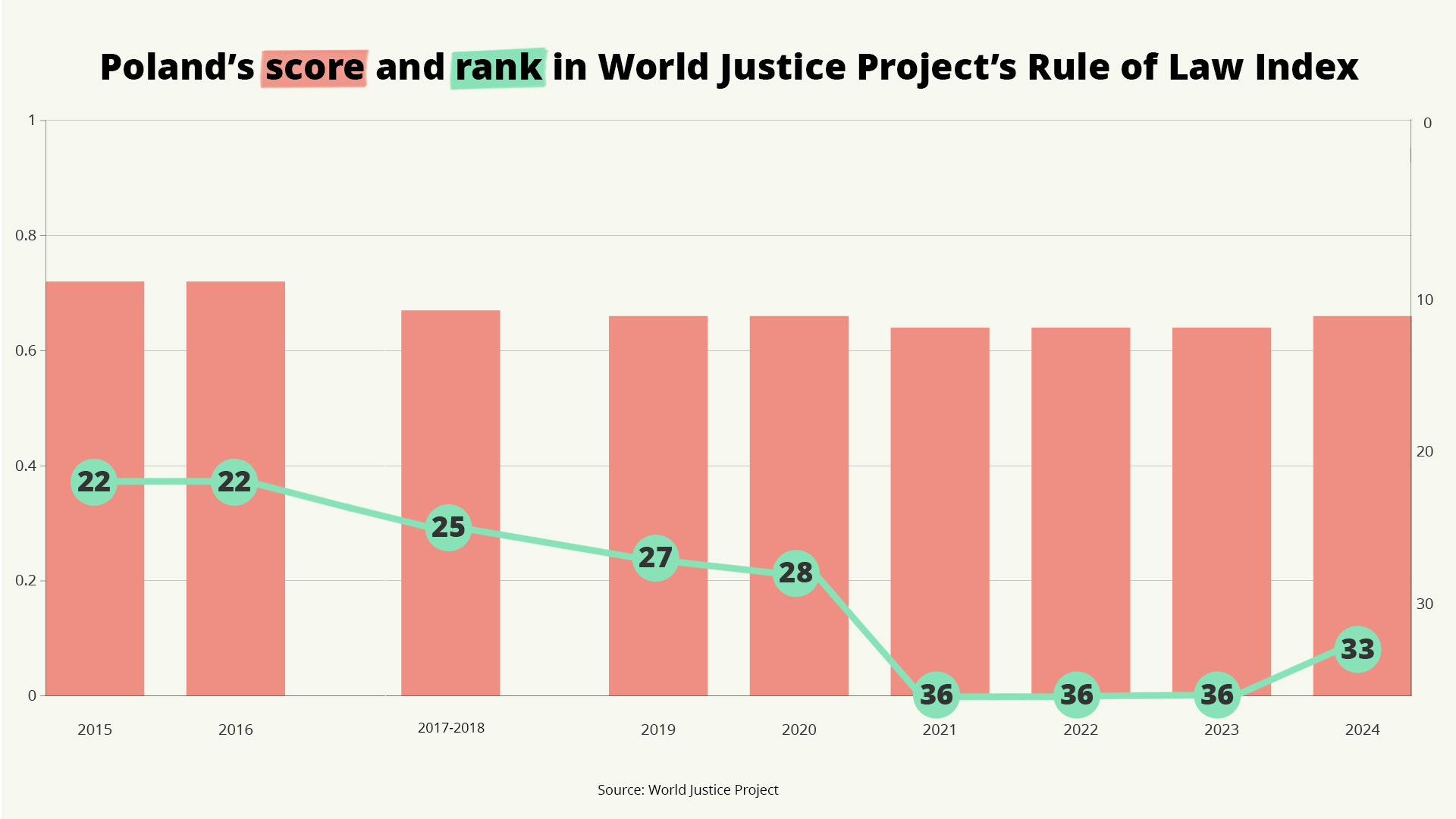Keep our news free from ads and paywalls by making a donation to support our work!

Notes from Poland is run by a small editorial team and is published by an independent, non-profit foundation that is funded through donations from our readers. We cannot do what we do without your support.
More Poles think the rule of law in Poland has got worse than better in the year since Donald Tusk’s coalition government took power from the former ruling Law and Justice (PiS) party, a new survey has found.
The poll, carried out by SW Research on behalf of Rzeczpospolita, a leading newspaper, asked Poles: “How has your opinion on the state of the rule of law in Poland changed after a year of Donald Tusk’s government being in power?”
The most common answer, given by 34.8% of respondents, was that “the situation has got worse”. That was followed by 28.2% who said that it has not changed. Only 24.4% of people said that the situation has improved, while 12.6% said they did not have an opinion.
Men (38.5%) were more likely to think the situation has got worse than women (31.6%). The lowest earners (45%) were also more likely to think so than the highest ones (26.5%).

Restoring the rule of law after eight years of national-conservative PiS rule was one of the key pledges made by Tusk’s more liberal coalition when it swept to power in late 2023. However, previous polling has also found Poles divided as to whether it is achieving that aim.
A United Surveys poll for Dziennik Gazeta Prawna and RMF FM in September 2024 found that 45.5% of people said they did not find the “government’s plans to restore the rule of law understandable”. Meanwhile, 41.8% said that they did find them understandable.
The same poll also asked the public what they thought of Tusk’s statement earlier that month in which he said that, to restore the rule of law, he would sometimes have to “make decisions…that will not all meet the criteria of full legality from the point of view of purists”.
A narrow majority of Poles, 50.8%, said they do not support such an approach while 37.5% said they do support it.
A poll by state research agency CBOS, also published in September, found Poles evenly split on whether the actions of Tusk’s ruling coalition were improving the rule of law (35%) or worsening it (33%).
A survey by IBRiS for Rzeczpospolita, published in August, found that 45.4% of Poles said they could see the government taking actions to improve the rule of law, while exactly the same proportion said they could not.
Meanwhile, a series of polls taken last month to mark one year since Tusk’s government took power found that most Poles negatively assess its work so far.
Polls conducted to mark one year since @donaldtusk took power show that most Poles negatively assess the work of his government so far and many more feel their lives have got worse than better.
Women and young people are particularly disappointed https://t.co/QWZWvbyQbW
— Notes from Poland 🇵🇱 (@notesfrompoland) December 13, 2024
During PiS’s eight years in power, it undertook a series of radical reforms to Poland’s justice system that were widely viewed by expert bodies, international organisations, and the Polish public to have undermined democracy and the rule of law.
But the Tusk government’s actions have also been mired in legal controversy, including a contested takeover of public media, the replacement of the national prosecutor, the appointment of judges, and efforts to prosecute former PiS ministers.
Those measures have, however, received endorsement from the European Commission, which unlocked Polish funds frozen under PiS and ended rule-of-law proceedings, saying it believes “there is no longer a clear risk of a serious breach of the rule of law in Poland”.
Meanwhile, this year saw Poland rise for the first time in eight years in the Rule of Law Index compiled by the World Justice Project, a US-based NGO, based on a survey of hundreds of experts and public polling.

Supporters of the Tusk government also argue that substantial reform of the justice system is not possible while PiS ally Andrzej Duda remains president and has the power to veto bills passed by the ruling coalition’s majority in parliament.
Duda’s second and final term in office ends this year, with elections to choose his successor taking place in May. The government hopes that, if a more friendly president is elected, it will be able to finally push forward with its agenda.
The ruling coalition has also been met with resistance from institutions, such as the Supreme Court and Constitutional Tribunal, that continue to be led and staffed by appointees put in place by PiS. That has often created legal chaos, with the government refusing to recognise decisions made by such bodies.
President Duda has chosen as the new head of the constitutional court Bogdan Święczkowski, who was a senior official under the former government.
The current government does not recognise the legitimacy of the court and is likely to continue to ignore it https://t.co/dpfQt9p0Y1
— Notes from Poland 🇵🇱 (@notesfrompoland) December 9, 2024

Notes from Poland is run by a small editorial team and published by an independent, non-profit foundation that is funded through donations from our readers. We cannot do what we do without your support.
All image credits: Krystian Maj/KPRM (under CC BY-NC-ND 2.0)

Daniel Tilles is editor-in-chief of Notes from Poland. He has written on Polish affairs for a wide range of publications, including Foreign Policy, POLITICO Europe, EUobserver and Dziennik Gazeta Prawna.



















